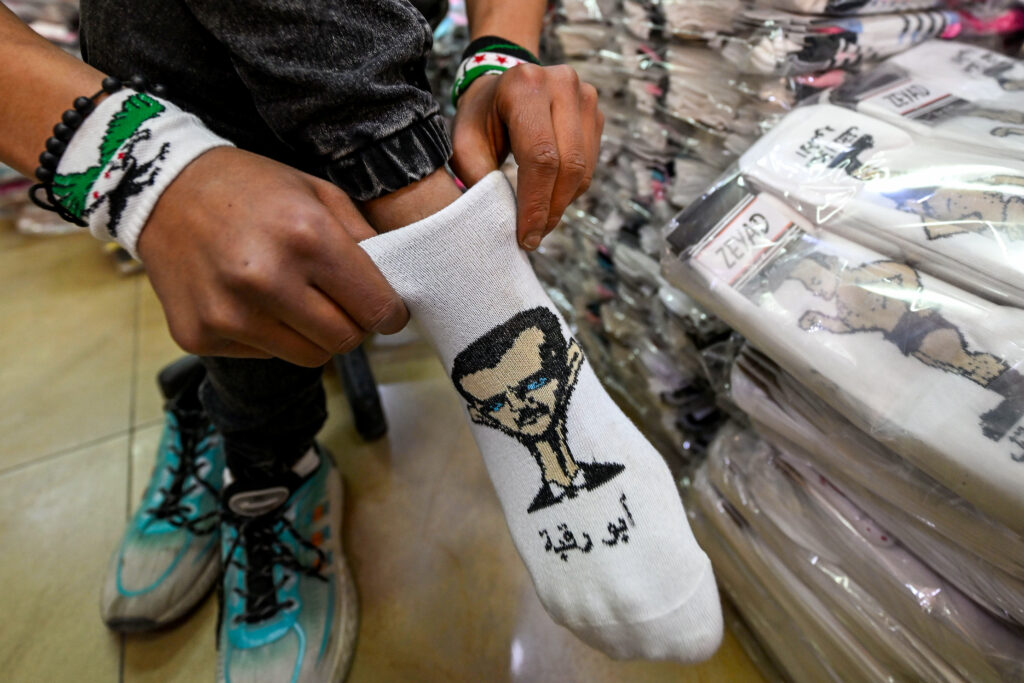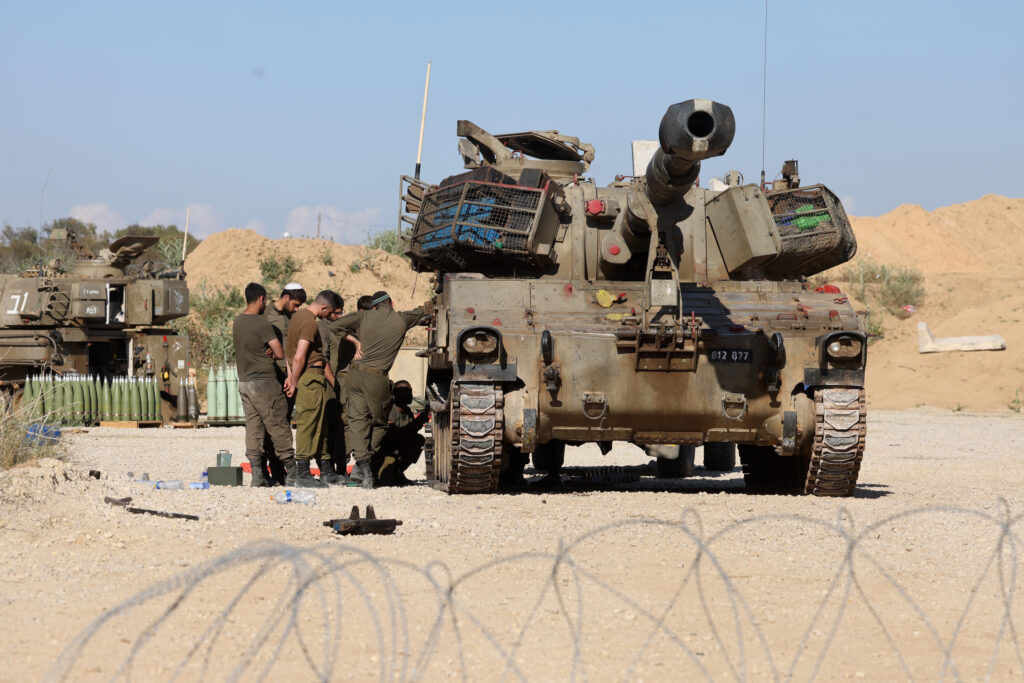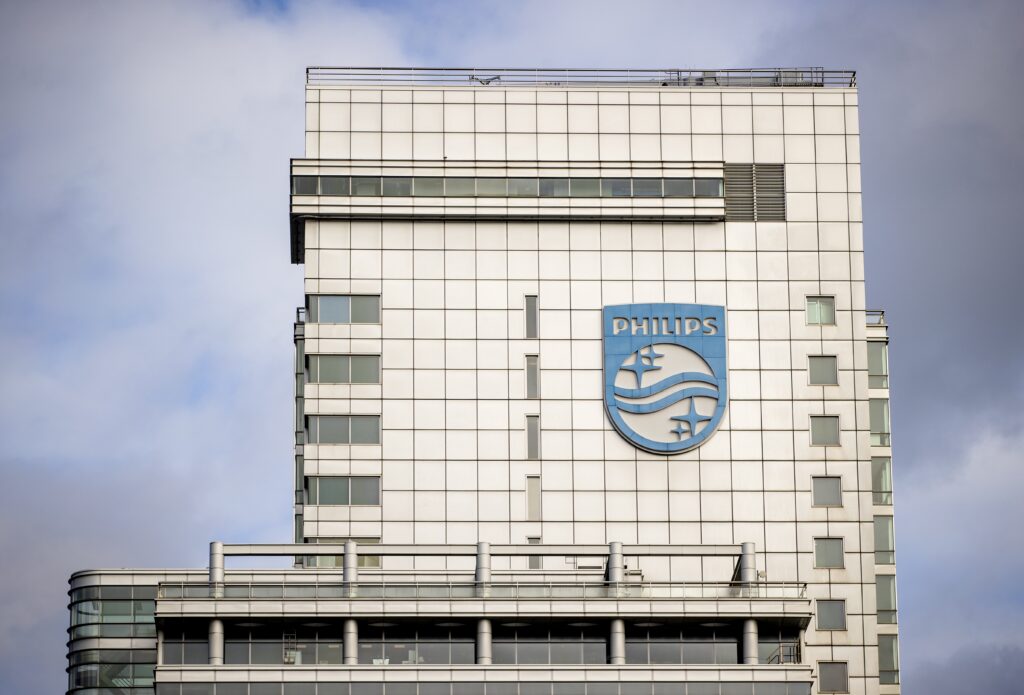AFP Asia Business
Socks and satire: Syrians mock ousted Assad dynasty
At Basel al-Sati’s souvenir shop in a central Damascus market, socks bearing caricatures that ridicule ousted Syrian leader Bashar al-Assad and his once feared family now sell like hot cakes.”I want to bring joy to people who’ve been deprived of happiness for so many days and years,” said Sati, 31, displaying pairs of white ankle-length socks.”Everyone who comes from abroad wants to buy the socks — some to keep as a souvenir, others to wear mockingly and take pictures,” he told AFP.”There are even some who buy them just to stomp on them,” he said.Stamping on someone’s image is considered deeply insulting in the Arab world, so the socks allow wearers to trample the Assads underfoot as they walk.Pictures of the Assad clan have gone from being ubiquitous symbols of repression to objects of derision and mockery since his December 8 ouster by Islamist-led forces after nearly 14 years of devastating civil war.Some socks showing Assad in sunglasses read “We will trample them”, while others depict him with heavily exaggerated features.Others bear a caricature of Hafez al-Assad who ruled Syria before his son, depicted in his underwear and chest puffed out.They bear the phrase “This is what the Assads look like” — a play on the family’s last name, which means lion.Assad’s once feared younger brother Maher labelled “the captagon king” also features. Western governments accused Maher and his entourage of turning Syria into a narco state, flooding the Middle East with the illegal stimulant.- ‘No better’ gift -Sati’s shop, brimming with other gift items, is decorated with images from Syria’s revolution.An image of Assad is on the ground at the entrance so people can walk on it.”It’s another kind of celebration, for all the Syrians who couldn’t celebrate in Ummayad Square after the fall of the regime,” Sati said.The Damascus landmark filled with huge crowds from across the country and hosted days of celebrations after Assad’s ouster, with people raising the now official three-starred flag symbolising the revolution.Afaf Sbano, 40, who returned after fleeing to Germany a decade ago, said she had come to buy “Assad socks”, which sell for around a dollar a pair, for friends.There is “no better” gift for those “who can’t come to Syria to celebrate the fall of the regime”, she told AFP.”I bought more than 10 extra pairs for my friends after I shared a photo on Instagram,” she said.”We had never dared to even imagine making fun of him” before, she added.- ‘People hate him’ -Manufacturer Zeyad Zaawit, 29, said the idea of socks to mock the Assads came to him after the former ruler was deposed and fled to Russia.Zaawit started with a small number and then ramped up production when he saw they were selling fast.”People hate him,” Zaawit said of Assad.”I took revenge on him this way after he fled,” he said, adding that the socks were so popular that some customers even paid in advance.Zaawit said he produced around 1,000 pairs in the first week and has since tripled production, making more than 200,000 pairs in three months.Images of the socks have been shared widely on social media and they have even been used in satirical television programmes.Assad’s own words have also been turned against him — including a refusal to meet Turkish President Recep Tayyip Erdogan, a foe who is close to Syria’s new authorities.Erdogan made repeated overtures to Assad in the period before his overthrow.In August 2023, Assad famously said: “Why should I meet Erdogan? To drink refreshments?”The pronouncement, now the subject of jokes on social media, appears on posters in food and juice stalls, sometimes accompanied by mocking images of Assad.
‘Makes no sense’: Hollywood shocked by Trump’s film tariffs announcement
Hollywood reacted with skepticism on Monday to US President Donald Trump’s announcement of 100 percent tariffs on foreign films, with movie insiders calling it a policy made up on the fly by a president who fails to understand how the industry works.”It makes no sense,” entertainment lawyer Jonathan Handel said of Trump’s idea.Handel told AFP …
‘Makes no sense’: Hollywood shocked by Trump’s film tariffs announcement Read More »
Hamas says no point in further Gaza truce talks
A senior Hamas official said Tuesday the group was no longer interested in truce talks with Israel and urged the international community to halt Israel’s “hunger war” against Gaza.”There is no sense in engaging in talks or considering new ceasefire proposals as long as the hunger war and extermination war continue in the Gaza Strip,” Basem Naim told AFP.He said the world must pressure the government of Israeli Prime Minister Benjamin Netanyahu to end the “crimes of hunger, thirst, and killings” in Gaza.The comments by Naim, a Hamas political bureau member and former Gaza health minister, came a day after Israel’s military said expanded operations in Gaza would include displacing “most” of its population.They come a day after Israel said its security cabinet approved the military’s plan for expanded operations, which an Israeli official said would entail “the conquest of the Gaza Strip and the holding of the territories”.Nearly all of the territory’s inhabitants have been displaced, often multiple times, since the start of the war sparked by Hamas’s October 7, 2023 attack on Israel.Gaza has been under total Israeli blockade since March 2 and faces a severe humanitarian crisis.Israel’s military resumed its offensive on the Gaza Strip on March 18, ending a two-month truce.The spokesperson for Gaza’s civil defence agency, Mahmud Bassal, said Tuesday that three Palestinians including a little girl were killed in Israeli dawn attacks on different areas of Gaza.A UN spokesman said Monday Secretary-General Antonio Guterres was “alarmed” by the Israeli plan that “will inevitably lead to countless more civilians killed and the further destruction of Gaza”.- ‘Large-scale evacuation’ -“Gaza is, and must remain, an integral part of a future Palestinian state,” Farhan Haq said.The Israeli decision comes as the UN and aid organisations have repeatedly warned of the humanitarian catastrophe on the ground, with famine again looming.On Monday, a senior Israeli security official said that “a central component of the plan is a large-scale evacuation of the entire Gazan population from the fighting zones… to areas in southern Gaza”.Military spokesman Effie Defrin said the planned offensive will include “moving most of the population of the Gaza Strip… to protect them”.French Foreign Minister Jean-Noel Barrot in a radio interview on Tuesday called Israel’s plan for a Gaza offensive “unacceptable”, and said its government was “in violation of humanitarian law”.For Palestinians, any forced displacement evokes memories of the “Nakba”, or catastrophe — the mass displacement in the war that led to Israel’s creation in 1948.On Monday, the health ministry in Hamas-run Gaza said at least 2,459 people had been killed since Israel resumed its campaign on March 18, bringing the overall death toll from the war to 52,567.Hamas’s October 7 attack on Israel resulted in the deaths of 1,218 people on the Israeli side, mostly civilians, according to an AFP tally based on official figures.Out of the 251 people abducted by militants that day, 58 are still held in Gaza including 34 the Israeli military says are dead.
‘Aussiewood’ courts Hollywood as Trump film tariffs loom
Australia still wants to make “great films” with the United States, Foreign Minister Penny Wong said Tuesday, as new tariffs threaten the home of Hollywood hits like The Matrix, Elvis and Crocodile Dundee.US President Donald Trump on Sunday announced 100 percent tariffs for all films produced in “foreign lands”, saying struggling Tinsel Town would be …
‘Aussiewood’ courts Hollywood as Trump film tariffs loom Read More »
Philips turns in a profit but China, tariffs weigh
Dutch medical device maker Philips reported a net profit for the first time in three quarters Tuesday despite weak sales in China but warned of “intensified” uncertainties due to tariffs.Net profits came in at 72 million euros ($82 million), compared to a net loss of 998 million euros in the same quarter last year and …
Philips turns in a profit but China, tariffs weigh Read More »





